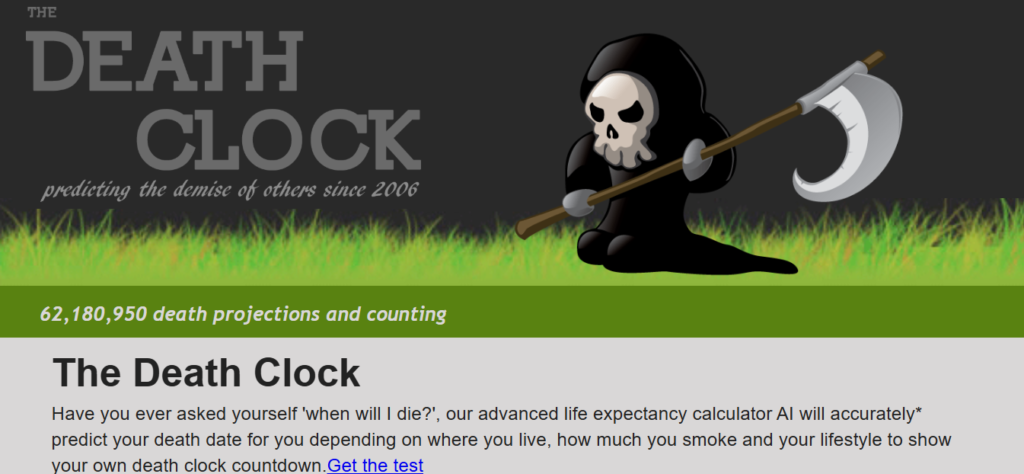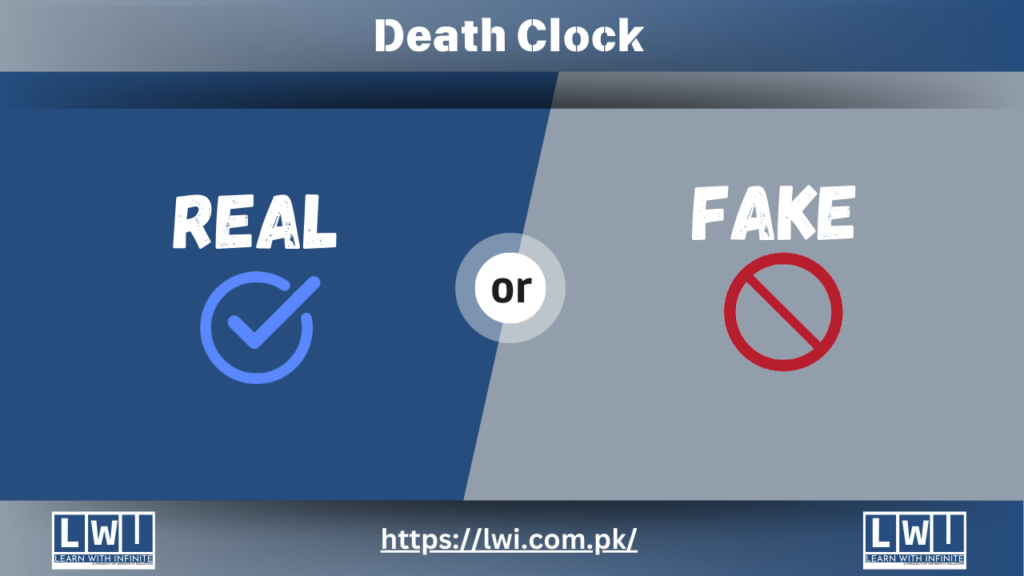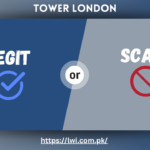The Death Clock is a fake death predictor website that claims to predict the exact time of an individual’s death based on basic personal details. However, it lacks scientific backing, relies on generalized data, and cannot accurately predict death due to the many unpredictable factors involved.
This article will explore why the Death Clock is not reliable, highlight its risks, and provide insights on more trustworthy ways to assess life expectancy.
What Is the Death Clock?
The death clock is an online website that claims to predict the date of an individual’s death based on various inputs. This so-called death calculator uses basic personal details like age, gender, and body mass index (BMI) to generate an estimate of when a person might die.
By using a predictive algorithm, the website calculates the chance of someone dying, providing an approximate timeframe based on the given data. While many are curious about its validity, it’s important to note that it does not actually possess the power to predict death with certainty, as it’s largely based on statistical averages and general health indicators rather than actual life events.
Although the death clock might be entertaining, its reliability remains questionable, leaving room for skepticism.
The Science Behind the Death Clock
The death clock website claims to predict the time of death by using a predictive algorithm that incorporates personal health and demographic data to calculate an individual’s life expectancy. This conceptual tool uses factors such as age, gender, and BMI (body mass index) to estimate how long a person will live.
While statistics show that women tend to live longer than men, the algorithm’s results rely heavily on general terms like higher BMI being correlated with a higher risk of diseases that can shorten one’s lifespan.
However, it’s important to note that such tools cannot be precise because life expectancy is influenced by unpredictable variables like genetics, accidents, and medical conditions.
The algorithm offers a general prediction, but lifestyle choices and other external factors still play a significant role in determining an individual’s actual longevity.
How Does the Death Clock Work?
When users visit the website, they are prompted to input basic details such as age, gender, and BMI by entering their data. Once the information is provided, the algorithm runs and uses these figures to generate an estimate of when the person might die.
This rough estimate is based on life expectancy data and does not offer a specific date, as it is impossible to predict with a high degree of accuracy. The calculator relies on general population data and trends, which may be more accurate for large groups than for individuals.
Factors like weather, broad climate patterns, and unique circumstances in a person’s life can significantly affect the result, making the predicting of a precise time inherently unreliable.

Is the Death Clock Real or Fake?
The truth is, the Death Clock is fake. While it might appear legitimate on the surface, there are multiple indicators that suggest the platform is a scam. Below, we will break down the key reasons why the death clock cannot be trusted.
1. No Scientific Foundation
The death clock makes claims about predicting the specific death date of a person, but it lacks any solid scientific foundation. Unlike life expectancy calculators that use actuarial data and insights from medical studies, the death clock does not account for individual factors like genetic predispositions, health, or longevity.
While it might reflect broader trends in populations, such as lifestyle choices and environmental factors, it fails to accurately predict death because it doesn’t consider the unique combination of influences like diet, exercise, alcohol consumption, smoking, or stress levels.
Although it may use general life expectancy statistics, the death clock is ultimately misleading, as it’s impossible to provide an accurate prediction of lifespan based on this kind of broad data without considering the complexities of living conditions and access to healthcare.
2. Lack of Transparency and Accountability
The Death Clock website raises several red flags when it comes to transparency and accountability. Unlike more legitimate websites that offer clear information about their creators and their goals, the Death Clock provides limited details about who is behind the platform or how they use user data.
The lack of transparency regarding the data collection process and the absence of an identifiable framework for accountability make it difficult to trust the validity of the predictions.
Without knowing how the site handles user details or the accuracy of its claims, it’s hard to consider it as a reliable source of information.
3. No Contact or About Us Pages
A trustworthy website typically includes an About Us page and a Contact Us page to provide insight into its mission, credentials, and the people behind it. However, the Death Clock lacks these essential features, which raises concerns about its legitimacy and ability to offer support for inquiries.
The absence of clear information about how the platform operates and who is behind it makes it difficult to trust the site as a reliable resource. Without these key pages, it’s hard to gauge the platform’s authenticity or ensure that it can be contacted for any issues or questions.
4. Non-Regulated Platform
The Death Clock operates as a non-regulated platform, lacking oversight from regulatory bodies that are typically present for more legitimate platforms. This absence of regulation raises concerns about the handling of personal data, including sensitive health-related information, which is vulnerable without proper privacy and safety measures in place.
Unlike regulated websites that follow strict guidelines to ensure sensitive information is protected, the Death Clock operates without the necessary checks and authorities to safeguard users, leaving it open to potential misuse.
5. Absence of User Reviews or Testimonials
The absence of user reviews or testimonials on the Death Clock website is a major red flag that casts doubt on its authenticity. Legitimate services often have reviewed or discussed experiences from users, offering direct feedback about the platform’s accuracy and reliability.
The lack of personalized service and attention to user experiences raises suspicions, as most credible websites are featured on review sites and forums, where independent reviews help build trust. Without independent reviews, the platform appears suspicious, making it harder to validate its claims or trust its functionality.
6. Promotion Through Social Media Ads and Unknown Influencers
The promotion of the Death Clock through social media ads and paid advertisements raises questions about its legitimacy, especially when the platform relies on unknown influencers for collaborations rather than well-known figures who are trusted for recommendations.
This tactic is often used by scam websites to attract traffic and target gullible users who might be swayed by flashy ads and influencer endorsements without questioning the credibility of the service.
7. No Verifiable Data or Proof
The Death Clock lacks verifiable data and evidence to support its claims, with no research studies or scientific papers from credible sources to back up the accuracy of its predictive algorithm.
Without transparency in how it processes data or provides any proof of its effectiveness, it raises concerns about whether it handles information responsibly, especially when predicting something as significant as life expectancy.
The Dangers of Trusting the Death Clock
While it may seem harmless, the Death Clock website can have significant psychological and emotional consequences for those who take it seriously. Here are some of the potential risks of engaging with such platforms:
1. Psychological Effects and Anxiety
Relying on the Death Clock can lead to an unsettling experience, causing anxiety and intense fear of one’s own mortality. The date provided may prompt individuals to obsess over their close date, leading to heightened depression and mental health issues.
The feeling of being helpless and out of control can further exacerbate these emotions, leaving people with a constant sense of unease as they grapple with the unpredictable nature of life.
2. Data Privacy Risks
The Death Clock website may expose users to significant data privacy risks by collecting personal information without adequate privacy regulations or oversight.
This lack of proper regulation increases the chances of data misuse and identity theft. Without strong data security measures in place, users’ sensitive details could be compromised, making them vulnerable to potential threats.
3. Potential Scam or Financial Exploitation
The Death Clock could be a potential scam designed to exploit users financially by preying on their curiosity and fear of death. With misleading claims about the ability to predict death, such platforms often sell products or services like life insurance or health consultations that are not supported by any legitimate credentials or endorsements.
This manipulation of emotions urges people to act hastily, making them vulnerable to exploitation. Therefore, users must remain cautious before engaging with such platforms.
4. No Accountability or Support
The Death Clock raises red flags by lacking a Contact Us page or any clear customer support, leaving users feeling misled and vulnerable. Without proper channels for inquiries or assistance, there is no way to ensure that personal data won’t be misused, and it becomes nearly impossible to verify the platform’s transparency.
In contrast to legitimate websites, which offer accountability and clear support systems, these gaps only increase the risks of engaging with such platforms.
Conclusion: Is the Death Clock a Scam?
In conclusion, the Death Clock is indeed a scam. Despite its intriguing concept, there is no scientific foundation for the claims it makes. The platform lacks transparency, has no user reviews, and does not adhere to any regulatory standards. Most importantly, the idea of predicting an individual’s time of death is impossible, as it disregards the multitude of factors that affect life expectancy.
If you encounter a website like this, it’s important to approach it with skepticism. While the idea may be intriguing, it’s essential to remember that death cannot be predicted, and such platforms are more likely to exploit your curiosity for their own benefit.
Final Advice
If you’re concerned about your health or longevity, the best course of action is to consult a medical professional or use scientifically-backed tools for assessing health risks. Always prioritize your well-being and avoid platforms that seem to offer simple answers to complex, unpredictable issues. Stay informed, protect your personal data, and be cautious about the services you trust online.
Check Similar Website Review: Is Nox GPT Legit or Scam?
Frequently asked Questions
What Is the Death Clock?
The Death Clock is a website that claims to predict an individual’s death date using basic personal details like age, gender, and BMI. However, it is not scientifically reliable and simply provides an estimate based on general health trends.
How Accurate Is the Death Clock?
The Death Clock is not accurate. It uses generalized data and doesn’t consider individual health factors or life events, making its predictions highly unreliable.
Is the Death Clock Based on Scientific Research?
No, the Death Clock lacks scientific backing. Unlike legitimate life expectancy calculators, it doesn’t account for personalized health data or genetic factors.
Can the Death Clock Actually Predict My Death?
No, the Death Clock cannot predict your death. It’s impossible to forecast death accurately due to the many unpredictable factors involved.
Is the Death Clock a Scam?
Yes, the Death Clock is a scam. It lacks scientific foundation, transparency, and accountability, and its main goal seems to be exploiting curiosity for profit.
Why Is the Death Clock Considered Fake?
The Death Clock is considered fake because it makes unsupported claims, lacks scientific methodology, and does not provide verifiable data.
Are There Any Dangers in Using the Death Clock?
Yes, using the Death Clock can cause anxiety and data privacy risks. It may also exploit users by promoting unrelated products or services, like life insurance.
Why Doesn’t the Death Clock Have Reviews or Testimonials?
The lack of reviews or testimonials raises doubts about its legitimacy, as legitimate platforms typically offer customer feedback for transparency.
What Should I Do If I Want to Know My Life Expectancy?
Consult a medical professional for a more personalized and accurate assessment, or use scientifically backed life expectancy calculators.
What Are the Risks of Using the Death Clock Website?
The main risks include data privacy concerns and financial exploitation, as the site may collect personal information and promote unverified products.







